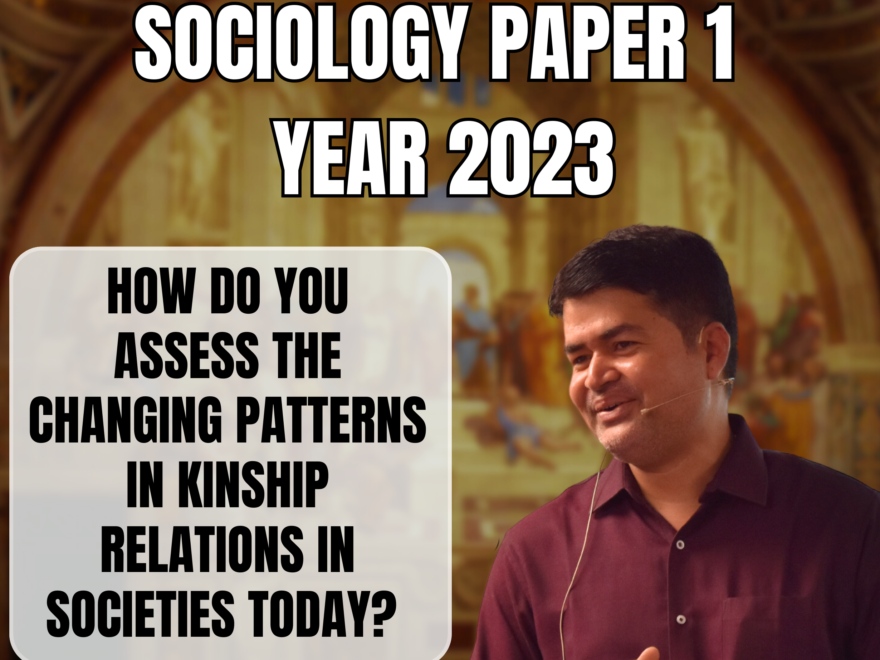How do you assess the changing patterns in kinship relations in societies today.
Section: A.
Sociology Paper 2023 Analysis.
Relevant for Paper 1: Unit 9 System of Kinship
Question 3 (b): How do you assess the changing patterns in kinship relations in societies today.
(20 Marks)
|
Introduction: Brief Background About Kinship. Main Body: Causes for Change in Patterns of Kinship Relation; Effect of Such Changes. Conclusion: Highlighting the Importance of Studying the Dynamism of Kinship. |
Introduction:
The kinship system is the way in which relations between individuals and groups are organized, occupies a central place in all human societies. Theodorson has defined Kinship as “a social relationship based upon family relatedness’. Kinship patterns have been influenced by a variety of factors, including cultural shifts, economic developments, technological advancements, and changes in legal and social norms.
Main body:
Causes for change in patterns of Kinship Relations:
- Individualism and Nuclearisation: With the advent of modernity and urbanisation, there has been a shift from joint families to nuclear families. The focus has shifted from collective identity to individual identity.
- This has led to a weakening of kinship ties as people are more concerned about their immediate family rather than extended kinship relations.
- For example, in urban India, many people prefer to live in nuclear families rather than joint families due to job mobility and the desire for personal space.
- Changing Gender Roles: The traditional kinship system was largely patriarchal. However, with the rise of feminism and women empowerment, women are no longer confined to the domestic sphere. This has led to changes in kinship patterns as women are now considered equal partners in the family.
- For instance, in many Western societies, women have the right to inherit property, which was not the case in traditional kinship systems.
- Influence of Technology: Technological advancements like Assisted Reproductive Technologies (ART) have also impacted kinship relations. ART has led to new forms of kinship relations like surrogate motherhood and sperm donation. These technologies challenge traditional kinship norms as they separate biological and social parenthood.
- Changing Marriage Patterns: In many societies, there has been a shift from traditional arranged marriages to love marriages. This shift has resulted in a higher frequency of inter-caste and inter-religious unions, live -in relationship , serial monogamy etc. which were previously uncommon. These inter-caste and inter-religious marriages are instrumental in the formation of new kinship relations, as individuals from diverse social backgrounds come together in matrimony.
- Also William Goode says that if the spouses are from different ethnic and social background, chances of divorce is increased.
- Influence of Law: Laws related to marriage, divorce, adoption, and inheritance have also shaped kinship relations. For example, the Hindu Succession (Amendment) Act, 2005 in India gave equal inheritance rights to daughters, which was a significant departure from the traditional patrilineal inheritance system
- Fictive kinship: New form of kinship patterns emerging due to weakening of kinship and familial bonds such as Fictive kinship. These kinship relationships aren’t based on blood relation or filial relationship. Rather they are based on social or economic considerations.
E.g. Relationship with colleagues in work sphere or with milkman or grocery store owner
- Nowadays, kins don’t regularly meet. They meet on destination weddings or group trips. Kinsmen are now-a-days connected through social media such as Facebook or Twitter.
- Alternate institutions: various functions of family and kinship groups have been taken by alternative institutions. For example placement function is no longer performed by family and now it is taken over by other economic organisations. Similarly jural rights of kinship are taken away by formal judicial institutions. Education function is taken away by schools.
Effect of such changes
- R Cavens noted that decline in kinship relationships results in decline in influence of mechanical solidarity. It causes suicidal tendencies among individuals.
- Decline in kinship relationships results in decline in group Identity. It causes alienation and isolation. To deal with such issues, new organisations such as Cults , sects , communal or caste based associations are emerging in urban areas. These are new kinship systems.
- According to William Goode nuclear families today carry heavier emotional burden due to lesser integration with wider kinship group and such social units become relatively fragile..
Conclusion:
Kinship relations are not static but dynamic. They change in response to socio-economic, political, and cultural changes in society. It is essential to understand these changing patterns in kinship relations to understand the changing social dynamics in societies.
Related Blogs…
To master these intricacies and fare well in the Sociology Optional Syllabus, aspiring sociologists might benefit from guidance by the Best Sociology Optional Teacher and participation in the Best Sociology Optional Coaching. These avenues provide comprehensive assistance, ensuring a solid understanding of sociology’s diverse methodologies and techniques.
META TAGS:
Iron Law of Oligarchy, Robert Michels, Vilfredo Pareto, Lions and Foxes theory, power dynamics, organizational oligarchy, elite circulation, political sociology, leadership styles, organizational control, sociological theories, political maneuvering, elite differentiation, power concentration, societal stability, political leadership, strategic political leadership, Sociology Question Paper, Sociology Question Paper 2023, Sociology Question Paper CYQ, Sociology Question Paper UPSC, What, according to Robert Michels, is the iron law of oligarchy? Do lions and foxes in Vilfredo Pareto’s theory, essentially differ from each other? Substantiate.
Why Vikash Ranjan’s Classes for Sociology?
Proper guidance and assistance are required to learn the skill of interlinking current happenings with the conventional topics. VIKASH RANJAN SIR at TRIUMPH IAS guides students according to the Recent Trends of UPSC, making him the Best Sociology Teacher for Sociology Optional UPSC.
At Triumph IAS, the Best Sociology Optional Coaching platform, we not only provide the best study material and applied classes for Sociology for IAS but also conduct regular assignments and class tests to assess candidates’ writing skills and understanding of the subject.
Choose The Best Sociology Optional Teacher for IAS Preparation?
At the beginning of the journey for Civil Services Examination preparation, many students face a pivotal decision – selecting their optional subject. Questions such as “which optional subject is the best?” and “which optional subject is the most scoring?” frequently come to mind. Choosing the right optional subject, like choosing the best sociology optional teacher, is a subjective yet vital step that requires a thoughtful decision based on facts. A misstep in this crucial decision can indeed prove disastrous.
Ever since the exam pattern was revamped in 2013, the UPSC has eliminated the need for a second optional subject. Now, candidates have to choose only one optional subject for the UPSC Mains, which has two papers of 250 marks each. One of the compelling choices for many has been the sociology optional. However, it’s strongly advised to decide on your optional subject for mains well ahead of time to get sufficient time to complete the syllabus. After all, most students score similarly in General Studies Papers; it’s the score in the optional subject & essay that contributes significantly to the final selection.
“A sound strategy does not rely solely on the popular
Opinion of toppers or famous YouTubers cum teachers.”
It requires understanding one’s ability, interest, and the relevance of the subject, not just for the exam but also for life in general. Hence, when selecting the best sociology teacher, one must consider the usefulness of sociology optional coaching in General Studies, Essay, and Personality Test.
The choice of the optional subject should be based on objective criteria, such as the nature, scope, and size of the syllabus, uniformity and stability in the question pattern, relevance of the syllabic content in daily life in society, and the availability of study material and guidance. For example, choosing the best sociology optional coaching can ensure access to top-quality study materials and experienced teachers. Always remember, the approach of the UPSC optional subject differs from your academic studies of subjects. Therefore, before settling for sociology optional, you need to analyze the syllabus, previous years’ pattern, subject requirements (be it ideal, visionary, numerical, conceptual theoretical), and your comfort level with the subject.
This decision marks a critical point in your UPSC – CSE journey, potentially determining your success in a career in IAS/Civil Services. Therefore, it’s crucial to choose wisely, whether it’s the optional subject or the best sociology optional teacher. Always base your decision on accurate facts, and never let your emotional biases guide your choices. After all, the search for the best sociology optional coaching is about finding the perfect fit for your unique academic needs and aspirations.
Follow us :
🔎 https://www.instagram.com/triumphias
🔎 https://www.youtube.com/c/TriumphIAS
🔎 https://t.me/VikashRanjanSociology
Find More Blogs…
| Compare and contrast Karl Marx’s and Max weber’s | Karl Marx- Historical Materialism |
| Position of Women In the Modern Indian Society | Sociology: Social system and pattern variables |
KEYWORD: changing patterns in kinship relations in societies, changing patterns in kinship relations in societies, changing patterns in kinship relations in societies, changing patterns in kinship relations in societies, changing patterns in kinship relations in societies, changing patterns in kinship relations in societies, changing patterns in kinship relations in societies, changing patterns in kinship relations in societies, changing patterns in kinship relations in societies, changing patterns in kinship relations in societies, changing patterns in kinship relations in societies, changing patterns in kinship relations in societies


